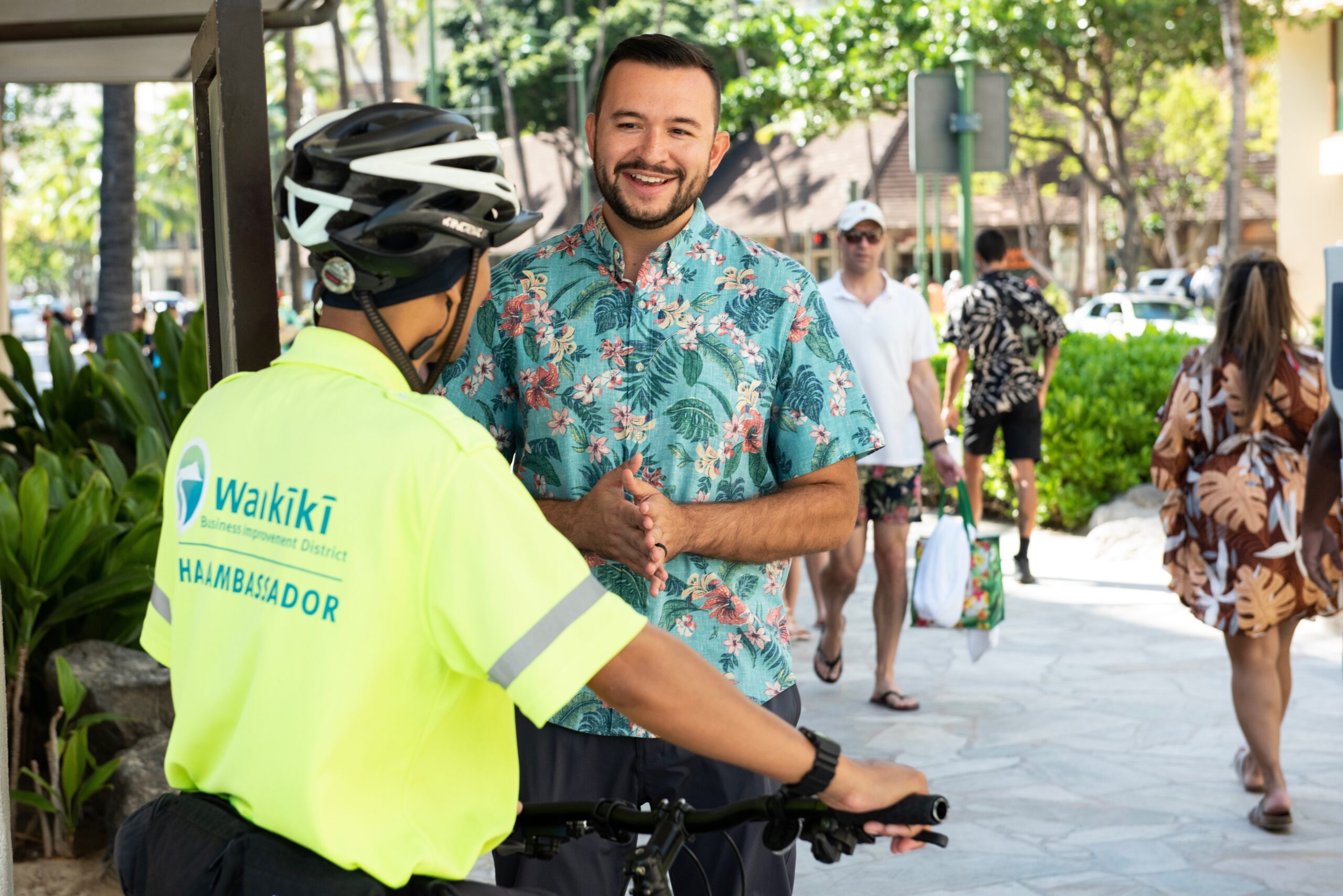
WBID for the last 20 years has deployed yellow-shirted Aloha Ambassadors in the daytime to keep Waikiki clean and safe, using a force of 60 men and women who also assist tourists needing directions or information.
Starting Thursday with a $250,000 grant from the city, a team of three male Aloha Ambassadors in a yearlong pilot project will conduct foot patrols every evening from 9:30 p.m. until 6 a.m. — concentrating on Kuhio Beach, considered the most dangerous area in Waikiki.
It is the first time the brightly dressed ambassadors have been out late at night to help police deter crime.
Two of them will be what WBID calls safety ambassadors, the other will be an outreach ambassador — more of a social worker to urge sidewalk and doorway sleepers to clear out before the parkʻs midnight closure and also offer them shelter and other forms of help.
“The safety ambassadors will be assisting outreach workers and also watching out for suspicious or criminal activity. We welcome the extra set of eyes and ears,” said HPD Maj. James Slayter, commander of Waikiki District 6.
Slayter told Civil Beat by email that HPD is understaffed overall by 400 officers. He said Waikiki needs an additional 30 officers heʻs hoping to recruit.
City Managing Director Mike Formby said the ambassadors are hired not to duplicate the hardcore crime-fighting efforts of HPD but rather to prevent violence from escalating into crimes and to talk to homeless people and mentally stressed street dwellers to encourage them to accept the services they need.
This new program comes at a time when overall numbers of crime on Oahu keep going down yet violent crimes involving guns on Oahu are increasing.
“Guns are very easy to get not just in Hawaii but all over the country,” said Honolulu Prosecutor Steve Alm.
You have to wonder if the ambassadors — three unarmed men with no law enforcement background who are trying to deter potentially dangerous behavior with friendly reminders and social service outreach — will do much to stop the more determined criminals.
The most recent gun-related crime happened at the Kuhio Beach pier when a gunman confronted six tourists from Japan at 1:30 a.m. June 20, demanding that they give him money before grabbing a bag filled with their passports, credit cards and cash and then fleeing.
Police have opened a first-degree robbery case. No arrest has been made.
The incident prompted the consul general of Japan in Honolulu to put an urgent crime warning on the consulate’s website on June 20, saying in Japanese, “To all Japanese nationals and tourists in Japan, we ask for your personal safety that you refrain from going out at night unless you have an urgent reason to do so.”
The tone of the alert was more extreme than the consul general of Japan’s usual warnings about hurricanes and pickpockets, not gun-carrying robbers.
The consulateʻs crime alert went on to say, “This place (Hawaii) has the image of being comparatively safe tourist destination, however, we are now entering high tourist season, and besides the above-mentioned armed robbery, a number of incidents can and do occur including pickpocketing, passports being stolen when left lying out, losing one’s important items.”
In Japan, individual gun ownership is prohibited. Gun violence is extremely unusual.
Trevor Abarzua, WBID president, said in a situation like the reported armed robbery of Japanese tourists, if the aloha safety ambassadors had been there, their very presence might have prevented the incident from happening.
“I cannot guarantee that but if a robber saw three very big men together in yellow shirts near where he was getting ready to make a move he might have thought twice about confronting the tourists,” he said.
He described the safety ambassadors selected for the late-night job as large and strong. “I would not want to mess with them,” he said.
Abarzua said he is confident aloha safety ambassadors will be able to handle any incident, and if a situation gets out of hand, they will always know when to call HPD to intervene.
In November, the city ended its former security contract in Waikiki with Matt Levi Corp. Leviʻs guards were retired police officers or currently employed officers working off duty — all of them from elite HPD units.
The city paid Levi $450,000 for the six-month pilot project, using federal post-pandemic recovery funds. That’s almost four times as much as it will be spending for the new yearlong, late-night Aloha Ambassadors patrols.
At the time, Formby said the city lacked the money to continue with Levi’s security force because its remaining federal funds were already spoken for by other city programs.
After the city’s contract with Levi expired, Formby’s office began to work with WBID to create a safety model that provided both security in Waikiki and provisions to connect people with the services to help them get off the sidewalks and beaches of Waikiki.
He said that best practices combine law enforcement with outreach and the prior program by Matt Levi was only enforcement.
“Matt Leviʻs group leaned more toward enforcement against individuals congregating in places with the potential to cause trouble. They would break up activities they knew would lead to crime or bad behavior,” he said.